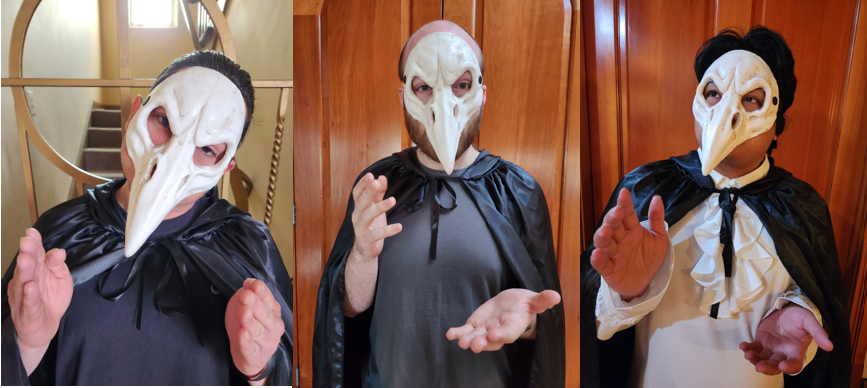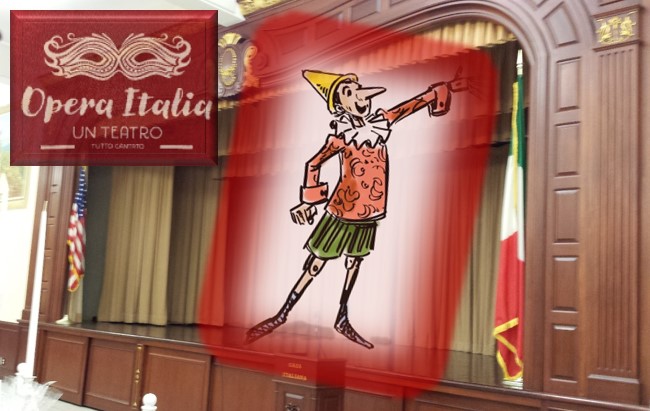Opera is, in the minds and hearts of many, a synonym with Italy: it was, in the end, created in the Belpaese, and here it developed the most. It shouldn’t surprise us, then, that operatic music has been an important identity signifier for many Italians and Italian-Americans, a symbol of their heritage and roots. This is, in a way, where the story of Opera Italia LA, founded by Francesca Taylor, begins.
Francesca had a lovely chat with L’Italo-Americano, not only to tell us more about Opera Italia LA, its goals, and its present and future programs but also about the way opera shaped her life as an Italian-American. Francesca shared beautiful memories and tales with us, and we are happy now to share them with our readers…
You mentioned you inherited your love for opera from your grandfather. What attracted you the most to opera when you were a child?
As a child, I was enchanted by how opera blended everything artistic together: the sounds of music and voices, the visual beauty of costumes and sets, the meaning of the libretto, the feel of elegance in the theater and in the audience… When my mother would take me to see an opera, I felt like I was immersed in a whole world. It was a world that I could be a part of, and being there with my music-loving Italian family members made it feel communal. It gave me a context. My mother’s older sister, my aunt, had a lovely singing voice and sang in Pittsburgh, where my grandfather first settled in America.
My grandfather was not actually a singer or musician himself; he simply loved music and loved opera. He and my Nanna had a record player, a fancy one for its day, that would play several records in succession, and he would place the vinyl discs in order on the center pole and let them play and play. I would listen to Verdi and Rossini and Bellini this way in their house, playing with my dolls and puzzles on the floor. Grandpa would be in the kitchen adjacent — he was a chef by profession — and I knew that after the “home opera,” we would have a delicious Italian dinner together.
Tell us something about Opera Italia: what brought you to create it and why, and what are its aims and objectives?
Somewhere in the middle of the pandemic, my piano teacher and I got to chatting about “putting on an opera.” My teacher, Oliver Chan, spoke often about his side work accompanying opera singers at UCLA, Santa Monica College, and other schools. I shared my natal love of opera with him, and we held fast to the idea and let it grow.
At the Casa Italiana in Los Angeles, there was a small non-profit opera company, the Casa Italiana Opera Company, that performed there for several decades. I took my children to see their productions because the atmosphere was welcoming and they always served a luncheon. In the beginning, I would bring my girls (three daughters), and I would tell them, “Now, we are going to the opera, for lunch and the show. Sometimes an opera show is long, so I’m just going to say we have to stay for the first act, and then we can go home and play.” And that’s exactly what we did, for about two years. My little girls didn’t get too squirmy, and I didn’t stress out thinking I had paid too much money for tickets. And then, at one opera, when I was about to pack them up and leave after the first act, my girls said, “But Mamma, why are we leaving early? Can’t we stay and see the end?” I was aghast, but so happy!
That nice company closed around 2015, and I really missed it. When Oliver and I talked about a venue for an opera, I thought of Casa Italiana immediately. Oliver is now my Music Director, and he conducts the Opera Italia Orchestra with finesse and professionalism. At the Casa, we position the orchestra right in front of the stage, and the audience truly enjoys seeing the musicians in live action, as well as watching the onstage show.
My aim with Opera Italia is to awaken the love of opera for Italians, Italian-Americans, Italophiles, and our Los Angeles community at large. I wish to see the youth of our communities experience opera as fun and meaningful, something they can own themselves. We have produced classic operas, modern operas, and we are preparing to inaugurate Young Opera Theater, a new non-profit for children and youth that will connect the genre of opera to young minds and hearts: I can’t wait to see where it will lead!
In May, you’re presenting a contemporary work, Natalia Valli’s Pinocchio, which is based, of course, on the famous Italian fairytale by Carlo Collodi. Can you tell us which factors made you choose this particular work?

I met Natalia Valli herself through a wonderful connection from our Italian American Museum of Los Angeles, where a fabulous special exhibit, all about Pinocchio, is on display right now. She and I shared a great supper together in Milan when I visited Italy recently. I love her music: this is an opera with varied themes and moods, and it re-creates Pinocchio authentically to Carlo Collodi’s original character. The singing, the colorful personalities, and the percussion-rich score make it wonderful for young people. We will feature a Corps de Ballet and an Opera Chorus, as Natalia composed it.
I chose this opera also for its message, a message that Collodi emitted in his original Pinocchio of 1883. The wily puppet was created in the sweep of the Italian Risorgimento (the Unification of Italy), and the government of the new, united Italy was vigorously pursuing a nationwide push for literacy and for a minimum achievement of fourth-grade education for all Italian children. This was no small feat, as simple as it may sound to our modern American ears. Pinocchio’s refusal to go to school, and his subsequent misadventures, were meant to illustrate how a young Italian could only develop into a worthy adult by studying and learning.
Natalia has shared with me that the initial aria, sung by Geppetto, was composed from the “profondita’ dal mio cuore” – from “the depths of my heart”. She interprets the parent Geppetto as a creator who seeks his child despite all obstacles… and she brings Pinocchio back to him jubilantly in the penultimate scene. Geppetto sings: “Non son piu’ solo! Mio bimbo m’ha trovato!” – “I am no longer alone! My child has found me!” (italics mine)
To me, a meaning emerges: for a country to survive, it must have its young, its children…and in order to thrive, that country must be sought and found by its children.

I think there are two big misconceptions about opera: the first is that opera is “élite music,” something that everyday listeners can’t “get.” The other is that opera is a genre of times gone by, something that Valli’s Pinocchio, of course, refutes entirely. How important is it to understand these things aren’t true?
Yes, great points!
When something is very valuable, it runs the risk of being grabbed and made into something elitist. I do think this occurred more outside of Italy than within Italy…saying that because I still find in piazzas and gardens in Italy those solo or group singers that just stand up and belt out opera arias, and the passersby stop to listen and put money in the hat. It doesn’t work like that in America. We do have wonderful community operas here, but it’s true that most folks think opera is something that well-heeled people go to see in fancy halls and theaters.
In these days of emergence from the pandemic, I see a great yearning for in-person engagements as well as a practical desire to continue using virtual encounters and meeting modes. I believe that if we all make time to experience opera in a social and fun atmosphere, opera will become a centerpiece for us again.
For us at Opera Italia, it also means listening to our audience and hearing people’s wishes. For instance, it is absolutely important to supply supertitles for the understanding of the story. This is not the case in many countries where romance languages are spoken, and people just understand things as they are sung, or just need to take a look at the libretto beforehand. My local LA audiences have said they truly want to know the story as it is being sung, and they still appreciate the Italian language because of its beauty with the music. Going to where children and young people are is critical in my opinion. For Pinocchio, we created a special interactive powerpoint to interpret each scene from the opera for elementary and middle school children. We just held our first Opera Night for Kids last Saturday, which was a huge success! Joined by two of my singers for Pinocchio, I led kids through all the fun of singing, painting props, trying out costumes, and then making up their very own mini-opera. It’s a “night out” for parents and an “Opera Night In” for kids. So my antidote to elitism or obsoleteism is versatility! Presenting a variety of operas (both classic and modern), amending these as needed, engaging audiences in participatory ways, and bringing opera to accessible venues will create a place for opera to resurge. I hope sincerely to see young people of today embrace the genre and create new opera—a theater all in song—from their own lived experiences.

What can we expect from Opera Italia in the next few months?
We are offering Opera Nights for Kids every other month; our next one is May 20th. Over the summer we will inaugurate Opera Camp, hopefully in two different locations in LA.
August will see us presenting an “Opera Double Bill” with Pergolesi’s La Serva Padrona and Wolf-Ferrari’s The Secret of Susanna. To be performed both at Casa Italiana and at a venue in San Pedro. For October, Italian Heritage Month, we are preparing a “bill of bells” with Donizetti’s Il Campanello (the Doorbell) and a fun mini-opera, Menotti’s The Telephone. In early 2024 we plan to produce Don Pasquale in full at a large venue, and then take its humorous excerpts to local small venues for community and school audiences.





























